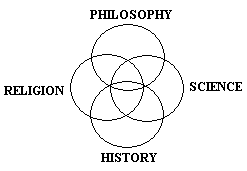
 Translations: 简体中文
繁體中文
Translations: 简体中文
繁體中文
 Translations: 简体中文
繁體中文
Translations: 简体中文
繁體中文To complicate matters there are a number of other areas such as Philosophy and History which also overlap both Science and Religion.

Religion and History also overlap. For much of the Bible contains historical records. To discard the Bible as historical because it contains religious content as well is logically fallacious. But so also is accepting its contents on blind faith. As an historical document it needs to be evaluated as any other alleged account of history. Most who have done so objectively, free of prejudice, have ended up becoming Christians. For despite the divine interventions and miraculous accounts which would seem to conflict with science, many find it convincing as an historical document. Remember that it is not Science which rules, but History. (For History is after all His-Story) Science is only about what normally happens, but not necessarily about what actually does happen in every case. Though it does not presume the miraculous, it cannot rule it out.
But it's not just concerning the miraculous where Science and Religion overlap, for they overlap even concerning what normally happens. For divine intervention is not always characterized as "miraculous". Consider Proverbs 16:33 "The lot is cast into the lap, but its every decision is from the LORD." If you flip a coin, the Lord determines the outcome. But that fact is neither proveable nor disproveable. Yes you can flip it many times and come up with a probability curve characterizing what normally happens. But you cannot determine the outcome of particular tosses. Science can say what might be, but the Lord says what will be. And there's no conflict between the two. If something unlikely happens, Science can only say it was unlikely within the limited frame of the scientific principle being applied, but not that it was impossible.
Concerning Evolution - the idea that things changed over time - while evolution conflicts with certain interpretations of the historical sections of the Bible, it is not in conflict with every interpretation of those sections. Nor is it is conflict with the direct overlap between religion and science. There are those who argue "God wouldn't do it that way", but who are they to say how God would do it? And such a statements come not only from certain Christians defending their interpretation of the Bible, but also from atheists who claim for example that a perfect God would not have designed things in such an imperfect sense - subject to corruption and such. But again I would argue who are they to say what God's purposes were in doing so. In fact their very objection may be answered in the Bible, which explains the bigger purposes of God. And it says, The LORD said to him, "Who gave man his mouth? Who makes him deaf or mute? Who gives him sight or makes him blind? Is it not I, the LORD?" Ex 4:11The skeptics fail in the realm of Philosophy to consider all the possibilities. The fact that nature is designed is a scientific inference, even more so than inferring, for example, intelligent beings as the source of radio transmissions communicating in a language form. It's a scientific inference as a jury would draw conclusions based upon forensic evidence. So if science being taught in the classrooms is to include not only its principles about what normally happens, but also inferences about things as those principles are applied, then isn't one of those inferences the fact that we are designed? Shouldn't that be taught also as a part of scientific curricula?